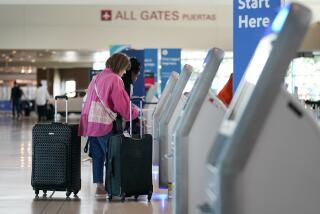Heavy Turbulence
- Share via
The human toll in any airline crash is always the immeasurable tragedy. But there are other costs as well. With airlines already reeling from the effects of Sept. 11, Monday’s American Airlines crash in New York only exacerbates the economic impact on the industry.
Further upheaval and consolidation of the air industry are certainties. The future health of the industry will depend in some way on the federal government, and Washington will be intimately involved in a way it hasn’t been since deregulation took place.
Sept. 11 did not so much create new problems for the industry as accelerate them. The airlines were already headed for billions in losses. The $5-billion cash bailout from the federal government has helped stave off the worst. But airlines have slashed 100,000 of 1.2 million jobs and cut routes. They have shuttered city ticket offices and airport clubs.
Some airlines are in better shape than others. American Airlines has $8 billion in planes and $2 billion in cash on hand. But all the airlines are burning through their cash, and United Airlines, US Air and America West are all extremely shaky. Southwest remains healthier.
The free marketeers argue that this is no cause for concern. The airline industry regularly goes through boom and bust periods, they say, and small carriers will step up to the plate, with their more flexible business plans and lower overhead costs. There is some truth to this, but what guarantees will there be that these carriers don’t start cutting corners on safety as they expand? One thing that Americans will have to pay for is increased security. Air fares are going to go up over the long term. The reason that airlines have run into so many security problems is precisely because of ruthless cost-cutting.
The truth is that Washington is going to play a big role in deciding which airlines survive and which don’t. The economic stabilization board, whose four members are Comptroller General David M. Walker and deputies of Treasury Secretary Paul H. O’Neill, Transportation Secretary Norman Y. Mineta and Federal Reserve Chairman Alan Greenspan, was created by Congress to oversee the bailout package. It decides which airlines get the $10 billion in federal loan guarantees. Airlines are supposed to demonstrate need for a loan, but worthiness is ultimately a political decision, which is why the board will be the subject of intense political pressures from Congress.
That means picking winners and losers, even if the board doesn’t want to say so officially. The White House and the stabilization board will have to work together to determine the minimum number of national air carriers necessary to ensure a competitive and secure transportation system.
Deregulation was put in motion during the Carter administration by economist Alfred E. Kahn, who believed that it would drastically increase competition and lower prices. Prices have indeed come down. But the frenzied cost-cutting has jeopardized safety and sent the airlines deep into the red. Full-scale re-regulation is neither likely nor desirable. But the government is going to have to tamper with the free market, both for matters of safety and to ensure that a competitive market continues to exist at all.
More to Read
Inside the business of entertainment
The Wide Shot brings you news, analysis and insights on everything from streaming wars to production — and what it all means for the future.
You may occasionally receive promotional content from the Los Angeles Times.










